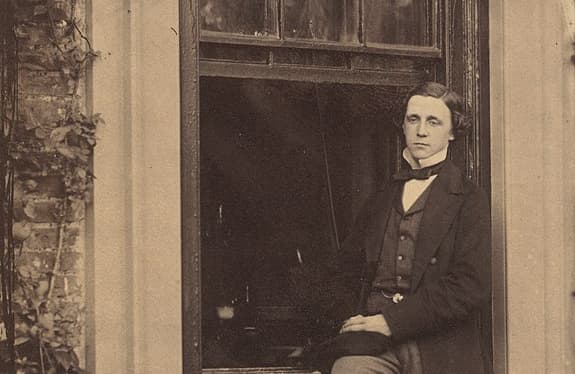Poem of the Day: ‘Atalanta in Camden-town’
Carroll plucks up the mythic Atalanta and drops her onto a London bus with a suitor who has not read his Ovid. Or his Swinburne, for that matter.

Among other things, Lewis Carroll (1832–1898) was an unabashed admirer of his Victorian contemporary, the poet Algernon Charles Swinburne (1837–1909). Swinburne was concerned, among other things, with creating a neo-Hellenic literature in English. In 1865 he published a long tragedy-in-verse, “Atalanta in Calydon,” dedicated to his mentor Walter Savage Landor and based on the Greek myth of the Calydonian boar hunt. The verse play concludes in an operatic 300-line call-and-response death scene, with each stanza consisting of four abab trimeter lines and a hexameter.
Enter, on the publication of this work, Lewis Carroll. In addition to being an admirer of Swinburne, Carroll, of course, was also a parodist. How better to signal his adulation than to poke fun at Swinburne’s “pure Greek” tragedy? Borrowing the verse play’s death-scene stanzas (though he breaks Swinburne’s final hexameter line over two lines), Carroll plucks up the mythic Atalanta (whose single defining characteristic, across all the stories in which she appears, is her determination never to marry) and drops her onto a London bus with a suitor who has not read his Ovid. Or his Swinburne, for that matter. Anyway, that’s it. That’s the joke.
But what if we didn’t know all this about Swinburne? Reading Carroll’s poem, we would still find ourselves caught up in the bounce and gallop of the meter, swept along by the rhymes. In blissful ignorance of the original tragedy, we might simply feel effervescent, with the giddiness of plunging through London at the top of an omnibus, in the sunshiny company of an attractive person. We, too, might not mind that we don’t catch what Atalanta says in the final stanza, that retort drowned out in the rattling of the omnibus: “What’s good for the goose is good for the gander.”
As a response to a marriage proposal, of course, the aphorism makes sense only if we remember who Atalanta is. In other words, better all around not to marry. But in a stanza that rhymes “gander” with “Leander” and “understand her,” does this stretch for a punchline really matter? Absent the backstory, Carroll’s language is still pure play. And that’s it, really. Fortunately for those of us who might not have read our Swinburne today, that too will suffice for a joke.
Atalanta in Camden-town
by Lewis Carroll
Ay, ’twas here, on this spot,
In that summer of yore,
Atalanta did not
Vote my presence a bore,
Nor reply to my tenderest talk, “She had
Heard all that nonsense before.”
She’d the brooch I had bought
And the necklace and sash on,
And her heart, as I thought,
Was alive to my passion;
And she’d done up her hair in the style that
The Empress had brought into fashion.
I had been to the play
With my pearl of a Peri —
But, for all I could say,
She declared she was weary,
That “the place was so crowded and hot, and
She couldn’t abide that Dundreary.”
Then I thought “Lucky boy!
‘Tis for you that she whimpers!”
And I noted with joy
Those sensational simpers:
And I said, “This is scrumptious!” — a
Phrase I had learned from the Devonshire shrimpers.
And I vowed, “‘Twill be said
I’m a fortunate fellow,
When the breakfast is spread,
When the topers are mellow,
When the foam of the bride-cake is white,
And the fierce orange-blossoms are yellow!”
O that languishing yawn!
O those eloquent eyes!
I was drunk with the dawn
Of a splendid surmise —
I was stung by a look, I was slain by a tear,
By a tempest of sighs.
Then I whispered “I see
The sweet secret thou keepest.
And the yearning for me
That thou wistfully weepest!
And the question is ‘License or Banns?’,
Though undoubtedly Banns are the cheapest.”
“Be my Hero,” said I,
“And let me be Leander!”
But I lost her reply —
Something ending with “gander” —
For the omnibus rattled so loud that no
Mortal could quite understand her.
___________________________________________
With “Poem of the Day,” The New York Sun offers a daily portion of verse selected by Joseph Bottum with the help of the North Carolina poet Sally Thomas, the Sun’s associate poetry editor. Tied to the day, or the season, or just individual taste, the poems will be typically drawn from the lesser-known portion of the history of English verse. In the coming months we will be reaching out to contemporary poets for examples of current, primarily formalist work, to show that poetry can still serve as a delight to the ear, an instruction to the mind, and a tonic for the soul.
